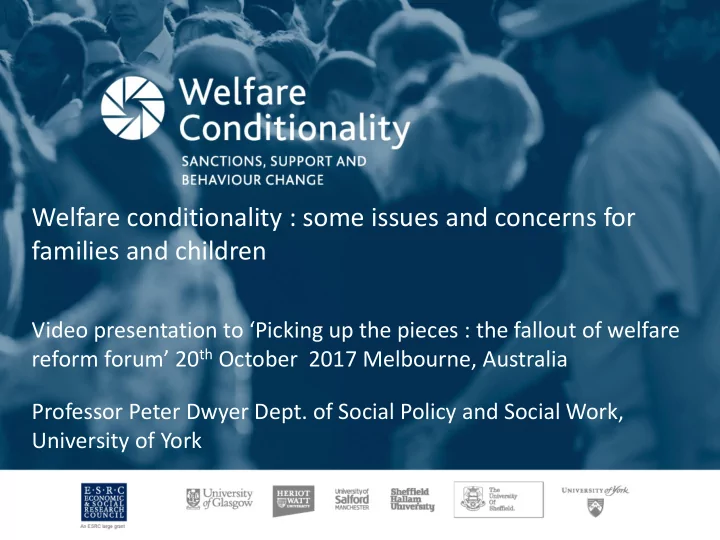

Welfare conditionality : some issues and concerns for families and children Video presentation to ‘Picking up the pieces : the fallout of welfare reform forum’ 20 th October 2017 Melbourne, Australia Professor Peter Dwyer Dept. of Social Policy and Social Work, University of York
2 Welfare conditionality: sanctions, support and behaviour change (2013-2018) Twin aims: To consider the ethics and efficacy of welfare conditionality Fieldwork with three sets of respondents: 1. Semi-structured interviews with 54 Policy Stakeholders 2. 27 focus groups with frontline welfare practitioners who implement policy 3. Three rounds of repeat qualitative longitudinal interviews with a diverse sample of (n.482 wave a) welfare recipients who are subject to conditionality i.e. 1,083 interviews in total. Lone parent : wave a 53 ; wave b 43 ; wave c 35 Funded by ESRC grant ES/K002163/2
Welfare conditionality? 3 A principle of (behavioural) conditionality Access to certain basic publicly provided welfare benefits and services should “be subject to the condition that those who receive them behave in particular ways, or participate in specified activities” (Deacon, 1994: 53 ) Combinations of Sanctions (‘sticks’) and Support (‘carrots’) Does ‘coercive welfare’ offer a potential for positive outcomes? (Phoenix, 2008) Conditionality within UK social benefit system Intensified, extended ,and personalised i.e. WFIs, work search, training activities “ Conditionality embodies the principle that aspects of state support, usually financial or practical, are dependent on citizens meeting certain conditions which are invariably behavioural” ( DWP, 2008, p1).
From ‘creeping’ to ‘ubiquitous’ conditionality in the UK 4 Conservative governments (1979-1997) Social security: Child Support Agency (1993), Jobseeker’s Act (1995), ‘Project Work’ (1997 ) Housing: Housing Act (1996) introductory tenancy periods, new powers for landlords to evict for nuisance and ASB New Labour governments (1997-2010) Social security: various ‘New Deals’ (from 1997), Welfare Reform and Pensions Act (1999), Welfare Reform Acts (2007, 2009), Jobcentre Plus (2002), Freud Report (2007), Employment and Support Allowance (2008) Management of anti social behaviour/housing : Crime and Disorder Act (1998) Anti-Social Behaviour Act (2003), Criminal Justice Act (2003), Supporting People (2003), Action Plan on Social Exclusion (2006), Respect Action Plan (RTF, 2006) Education and healthcare: Sure Start Maternity Grant (2001), The Skills for Life Scheme (2001), Welfare Food Scheme (2002) Cons/Lib Coalition/Conservative governments 2010-ongoing Enthusiastic endorsement of ESA: use of WCA to reclassify many disabled people as fit for work Mandatory Work Activity (May 2011): using the discipline of work for JSA claimants with poor work records/ethic The Work Programme (June 2011) The Welfare Reform Act (2012): Intensified, personalised and extended conditionality Universal Credit : the extension of conditionality to in work benefit recipients for the first time
5 Concerns about WC for parents and children Sanctions detrimental effects My daughter could not attend school for two weeks. I didn’t have any money for that; you have to give her some money every day for some lunch and for a bus (WSU, migrant, male, Scotland) So , I can’t afford to eat at the moment… So, he [my son] has that, like he’ll eat my food , I don’t care. He even says, ‘Why aren’t you eating?’ ‘I ate earlier.’ (WSU, lone parent, female, England) Variable support from the Job Centre and Work Programme I thought it should be a place that’s supposed to help you to find work and I never received any help to find work... People are very much on their own to find work. (WSU, lone parent, female, Scotland) I t’s down to the individual who they assign to be your [Work Programme ] coach. I’m lucky enough that the person who is currently my coach is a brilliant person. He is really accommodating in the sense that he respects the fact I’m a lone parent. (WSU, lone parent, female, England)
6 Welfare conditionality moving LPs into paid work? WC can be counterproductive and reduce the chances of LPs finding work Before I was getting sanctioned I was all right, I was sorted; I had a laugh with everybody, everybody knew me. Then when the sanctions started kicking in I just changed; I couldn’t be bothered, wasn’t going out, I wasn’t bothered about looking for a job. I just went right downhill. (WSU, lone parent, male, England) Moving some LPs back into work but at a price Haven’t got set days. Again, like tonight I'm working until six. Monday I worked until eight. On Friday night I'm working until half eight…I'm relying on my mum a lot at the moment if I'm honest. She's not very well and I think it's taking a toll on her too…I have suffered from depression obviously since this has happened…The pressures that are put on you to find work. Obviously I want to work. The stresses of then again not seeing the children as much…I'm on medication…I suppose it's catch 22 again. I didn’t want to be going in to sign on and going through that process every week and feeling degraded and everything else …. I took a job that wasn't beneficial to me or the children but again I felt I had no option because they won’t give me JSA. So I've got to stick at it until I find something else. (WSU, social tenant, female, England)
Prof. Peter Dwyer, Principal Investigator Peter.dwyer@york.ac.uk Fleur Hughes, Project Manager Fleur.hughes@york.ac.uk www.welfareconditionality.ac.uk Final conference 26-28 th June 2018 University of York, UK Follow us @WelCond
Recommend
More recommend